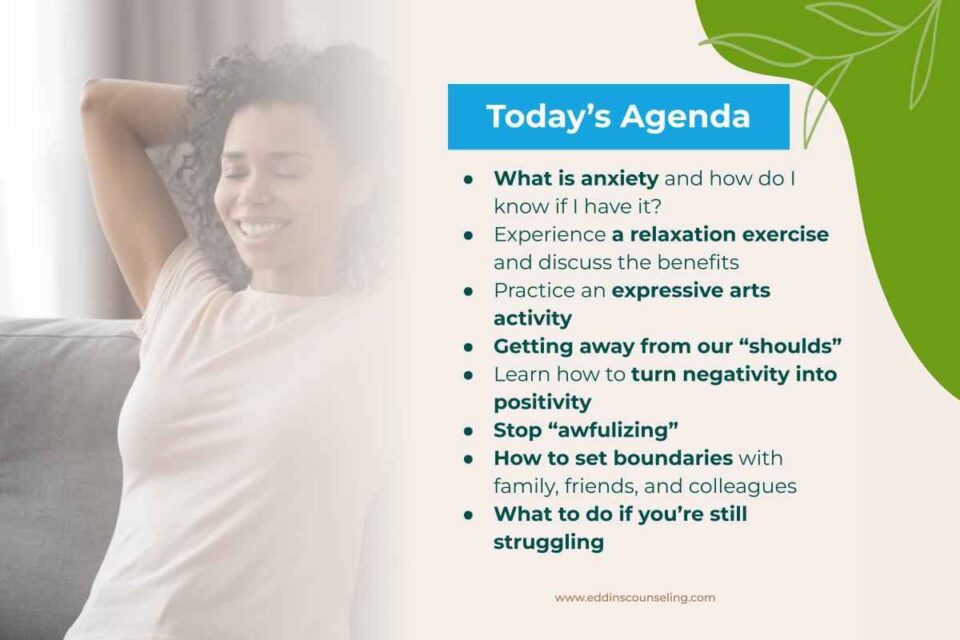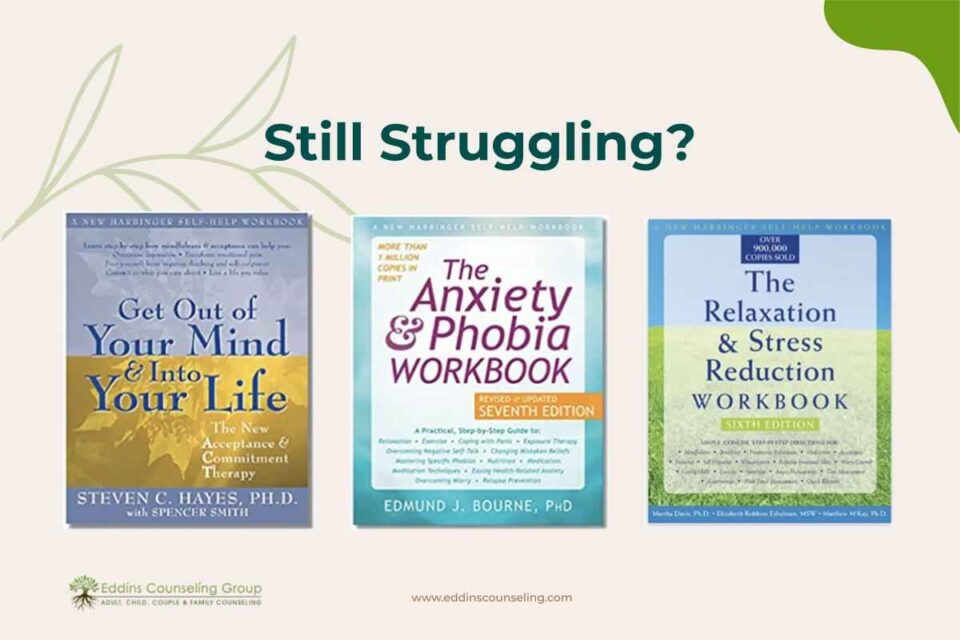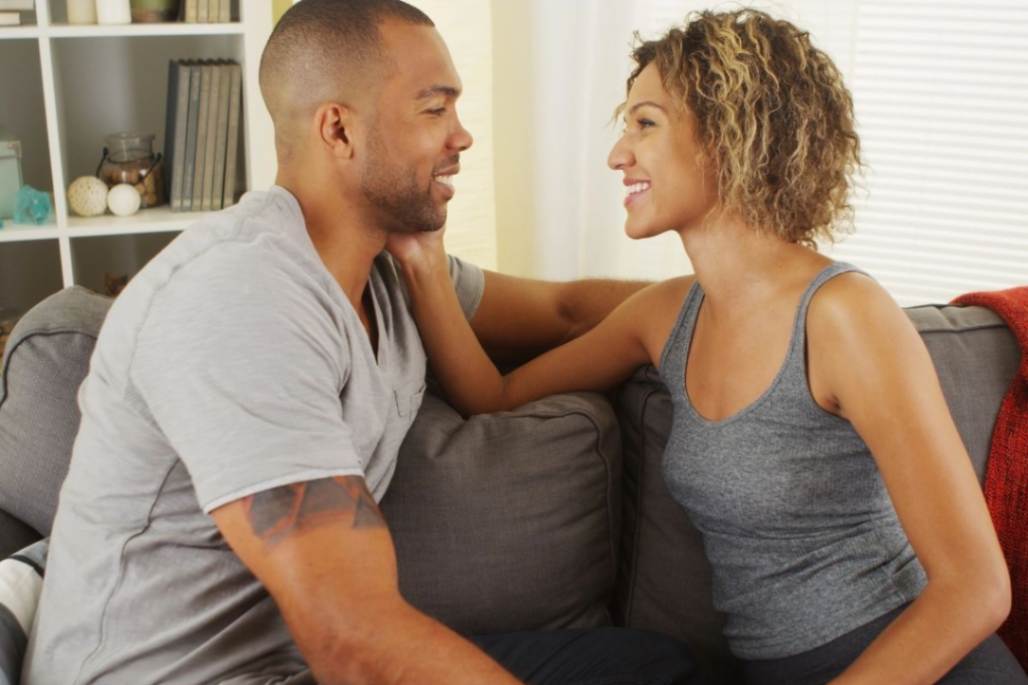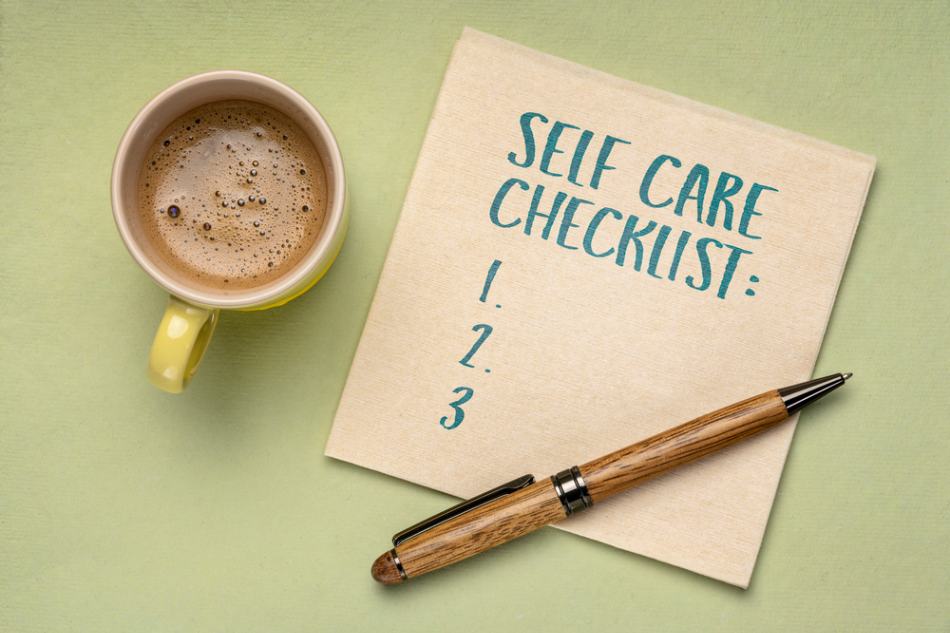April 2, 2013
Webinar: Tired of Living with Anxiety? Learn 3 Powerful Strategies You Can Use for Anxiety Relief
Written by Rachel Eddins
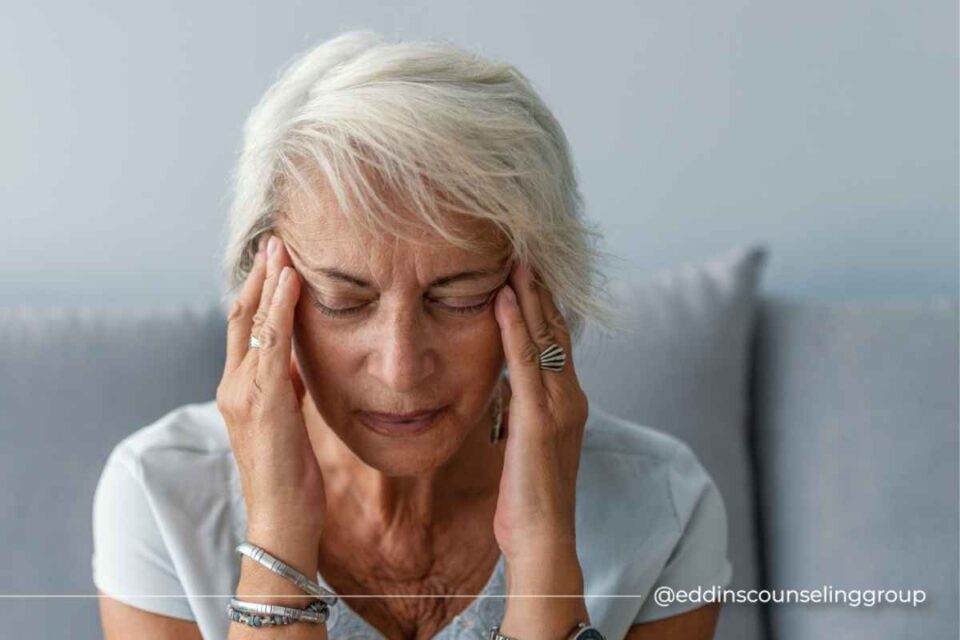
The webinar today is called Strategies for Anxiety Relief. This webinar is for anyone who is struggling with symptoms of anxiety. We will talk about strategies you can use to find anxiety relief.
You may want to talk with an anxiety counselor to identify more specific strategies for your unique type of anxiety. Watch the video for more details.
This webinar is facilitated by Becky Reiter, a Licensed Professional Counselor (formerly) with Eddins Counseling Group in Houston, Texas.
Watch a replay of the presentation here.
Learn more about anxiety and ways talking to a therapist can help with anxiety.
Here is a transcript of the webinar:
Good afternoon! Thank you for attending my webinar: Tired of Anxiety? Three Powerful Strategies for Anxiety Relief.
My name is Becky Reiter, and I’m a Licensed Professional Counselor (formerly) with Eddins Counseling Group in Houston, Texas.
If you’re attending the live webinar, please notice on the right-hand side there is a chat function. I’ll be answering questions during the last 15 minutes of the webinar. Your questions are completely private, so please feel free to ask me any questions.
Also, if you’re attending the recording of this, please email us at info@eddinscounseling.com with any questions you might have, and we will be happy to answer them.
This is also a gentle reminder that we’re going to do a couple of exercises on the call, so I invite you to minimize your windows and put your phone on silent so you can completely focus and fully benefit from the webinar.
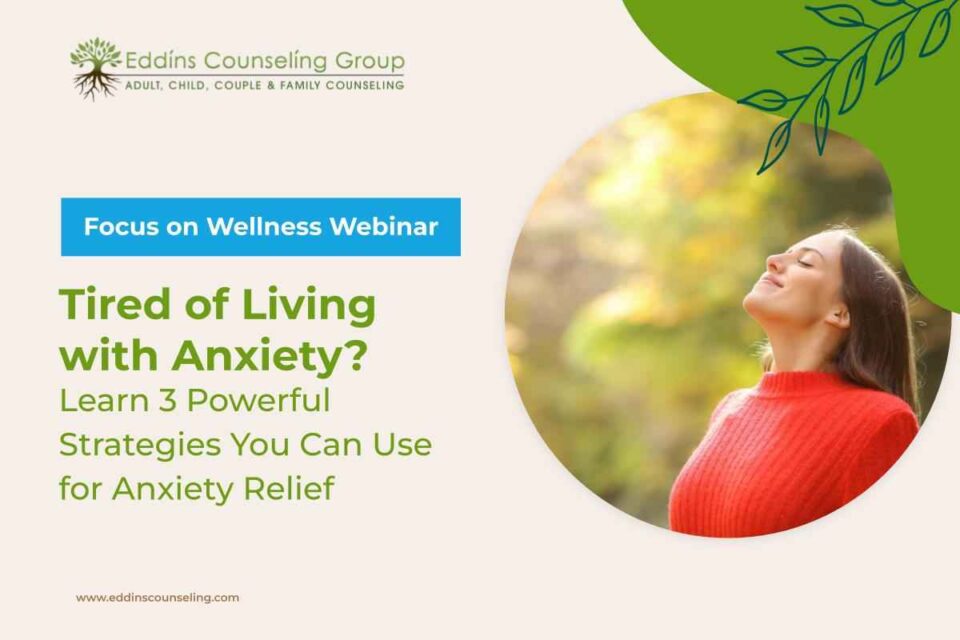
Today’s Agenda
- What is anxiety and how do I know if I have it?
- Experience a relaxation exercise and discuss the benefits
- Practice an expressive arts activity with supplies you already have on hand-getting away from our “shoulds”
- Learn how to turn negativity into positivity – stop “awfulizing”
- How to set boundaries with family, friends, and colleagues
- What to do if you’re still struggling
On today’s agenda, we’re going to learn what is anxiety and how do I know I have it. We’re going to experience a relaxation and mindfulness exercise and discuss the benefits. We’re going to practice an expressive arts activity with supplies you already have on hand and learn how to get away from our “shoulds”.
You’re also going to learn how to turn negativity into positivity and stop “awfulizing”. You’re going to learn how to set boundaries with family, friends, and colleagues, and what to do if you’re still struggling after this webinar.
Who is This for?
- Anyone who has:
- Trouble falling asleep or staying asleep
- Constantly feels tense in the neck and shoulders
- Feels like they worry about everything all the time
- Someone telling them they worry too much
- Thinks they fidget a lot
- Feels like their heart is going to pound out of their chest when they are in a difficult or upsetting situation
- Stomach pain, where doctors can’t find the reason or cause
- Meltdowns or panic attacks when they feel overwhelmed and feel like they can’t handle how anxious they feel all the time
So who is this webinar for?
This webinar is for anyone that may categorize themselves as someone who feels anxiety. It’s anyone who might have trouble falling asleep or staying asleep, constantly feels tense in the neck and shoulders, and feels like they worry about everything all the time.
Maybe has someone in their life telling them they worry too much. Someone who thinks or is told they fidget a lot, like tapping their fingers on the table, or bouncing their knees.
Feels like their heart is going to pound out of their chest when they’re in a difficult or upsetting situation. Maybe has stomach pain where doctors can’t find a reason or a cause, or has meltdowns or panic attacks when they feel overwhelmed and feel like they can’t handle how anxious they feel all the time.
Quick Disclaimers
- Anxiety is different for everyone
- Some tools might work for you and some may not
- This webinar is just a starting point
- There are no quick fixes
- It takes time and you have to be willing to do the work
- These are strategies I have used personally myself or with clients
- I do not believe that anxiety can be “controlled” or “go away” – you just learn how to cope with it better
A few quick disclaimers. Anxiety is very different for everyone. There’s not just a single disorder for anxiety. There are multiple anxiety disorders like:
- generalized anxiety disorder,
- OCD (obsessive-compulsive disorder),
- Posttraumatic stress disorder is also considered an anxiety disorder, but it’s very different. I’ll talk about that a little bit later.
Some of these tools might work for you and some may not. Please don’t give up if these tools don’t work.
This webinar is just the starting point and there are a lot of other strategies and resources out there if these tools don’t work for you.
Also, when it comes to anxiety, there really are no quick fixes. To learn how to cope with anxiety, does take time. You have to be willing to do the work and try a lot of different strategies and try a lot of different tools.
The reason I chose these strategies is because these are ones I’ve used personally myself or with my clients. I personally don’t believe that anxiety can be “controlled” or “go away”. We just learn how to cope with it better.
For example, if you try to control your anxiety and stop thinking about it, then that’s when a lot of times the physical concerns manifest. You have a lot of those physical symptoms that doctors are clueless as to why you might have them.
About Me
So I’ve been anxious since the first grade. I was very fortunate to have a wonderful family and a great school counselor to help me through my difficult transition into first grade.
I feel my anxiety was generally well-controlled until graduate school. It was definitely manageable and more on the healthy anxiety side in terms of making me study for all my tests and things like that.
But once I hit graduate school, it was very stressful. It was very different from being an undergraduate student.
So my anxiety hit that “awfulizing” stage where it spiraled out of control for me.
I sought counseling from my college counseling center, which I would recommend for any college student if it’s an option for you. And I became a Licensed Professional Counselor.
So I learned so many ways through my own counseling how to help my clients as well as constantly staying up on new techniques and new strategies out there for anxiety so that I could help my clients.
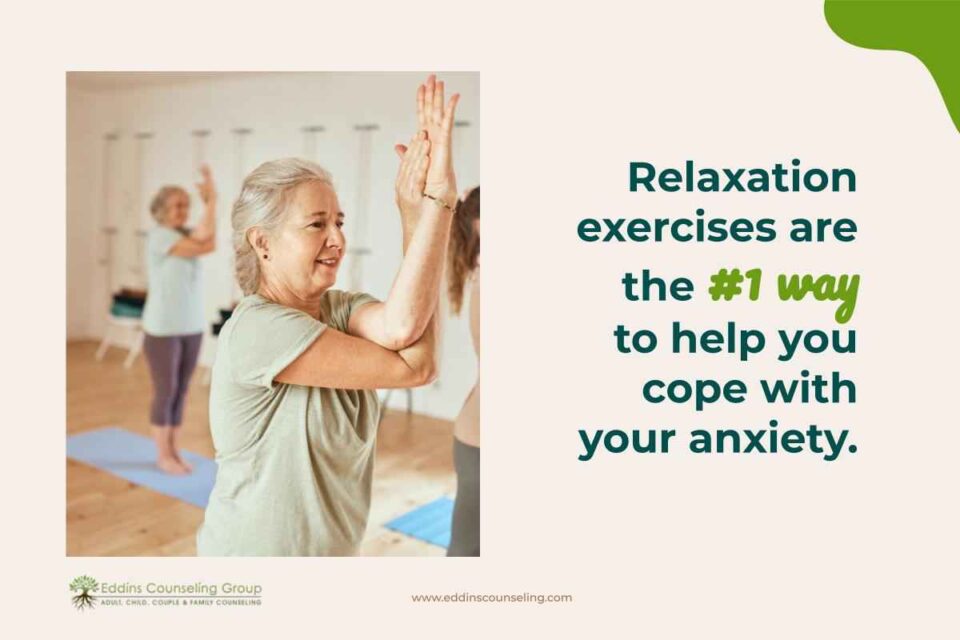
What is Anxiety?
So what’s a general definition of anxiety? I would say it’s an emotional state in which people feel uneasy, apprehensive, or fearful.
People usually feel anxiety about events they cannot control or predict or about events that may seem threatening or dangerous.
Physical Symptoms
Gastrointestinal
- Dry mouth
- Difficulty in swallowing
- Epigastric discomfort
- Aerophagy (swallowing air)
- “Diarrhea” (usually frequency)
Respiratory
- Feeling of chest constriction
- Difficulty in inhaling
- Overbreathing
- Choking
Cardiovascular
- Palpitations
- Awareness of missed beats
- Chest pain
Genitourinary
- Increased frequency
- Failure of erection
- Lack of libido
Nervous system
- Fatigue
- Blurred vision
- Dizziness
- Sensitivity to noise and/or light
- Headache
- Sleep disturbance
- Trembling
Psychological symptoms
- Apprehension and fear
- Irritability
- Difficulty in concentrating
- Distractability
- Restlessness
- Depersonalization
- Derealization
Here are some physical and psychological symptoms.
You’ll notice gastrointestinal issues, or cardiovascular, maybe heart palpitations, or chest pain.
If you do feel anything that’s cardiovascular, I strongly recommend that you go and get it checked out by a doctor before you think you have anxiety because there could be something wrong.
So I think it’s really important to go have that checked out first and have the doctor diagnose you with anxiety if you do have any cardiovascular concerns. I always recommend for all of my clients to have full physicals before they come in for counseling.
There are also psychological symptoms such as irritability, which you can definitely notice with family members or loved ones. Also difficulty in concentrating and distractibility.
You might notice that more at work if you have a project that you’re working on and you can’t stay focused, or you’re easily distracted from that project and then that compounds the anxiety because you know you have a deadline. So it can definitely be very challenging.
Relaxation Exercise
We’re going to start off with a relaxation exercise just to kick off our webinar because I feel that relaxation exercises are the number one way to help you cope with your anxiety.
Personally, I enjoy this exercise. I do it often with my clients. So please go ahead and just sit back and listen.
Get in a comfortable position in your chair. Sit upright with your feet flat on the floor, your arms and legs crossed, and your hands resting in your lap. Palms up or down, whichever is more comfortable. Allow your eyes to close gently.
Take a few moments to get in touch with the movement of your breath and the sensations in your body.
Bring your awareness to the physical sensations in your body, especially to the sensations of touch or pressure, where your body makes contact with the chair or the floor.
Now, slowly bring your attention to the gentle rising and falling of your breath in your chest and belly. Like ocean waves coming in and out, your breath is always there.
Notice its rhythm in your body. Notice each breath. Focus on each inhale and exhale.
Notice the changing patterns of sensations in your belly as you breathe in and as you breathe out.
Take a few moments to feel the physical sensations as you breathe in and as you breathe out. There’s no need to try to control your breathing in any way. Simply let the breath breathe itself.
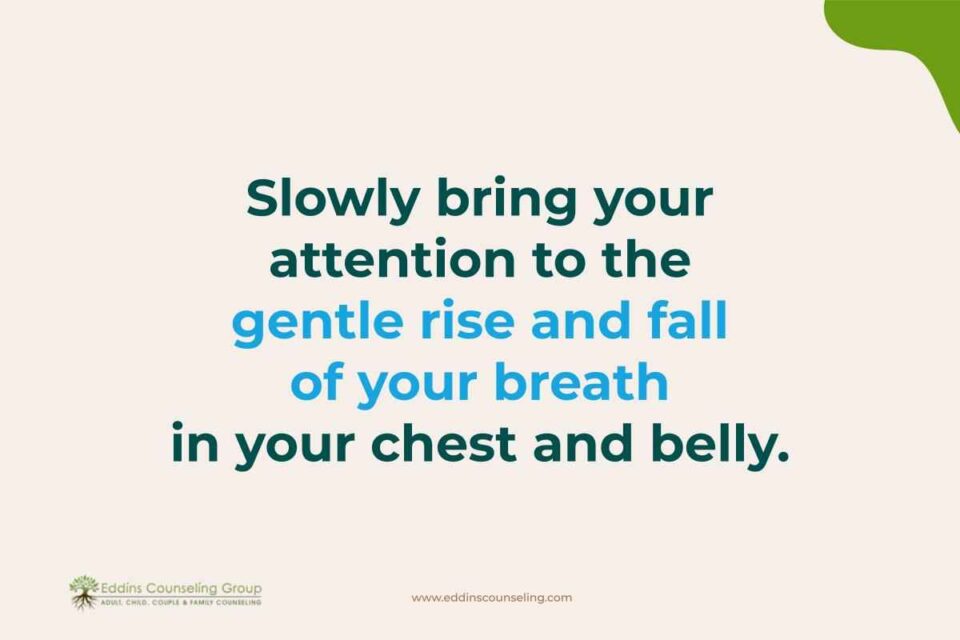
As best you can, also bring this attitude of generous allowing and gentle acceptance to the rest of your experience. There is nothing to be fixed, no particular state to be achieved. As best you can simply allow your experience to be your experience without needing it to be other than what it is.
Sooner or later, your mind will wander away from the breath to other concerns, thoughts, worries, images, bodily sensations, planning, or daydreams, or it may just drift along. This is what minds do much of the time.
When you notice that your mind has wandered, gently congratulate yourself. You have come back and are once more aware of your experience.
You may want to acknowledge briefly where your mind has been and gently escort your attention back to the sensation of the breath coming in and going out.
As best you can, bring a quality of kindness and compassion to your awareness, perhaps seeing the repeated wanderings of your mind as opportunities to bring patience, and gentle curiosity to your experience.
When you become aware of bodily sensations and feelings, tension, or other intense sensations in a particular part of your body, just notice them, acknowledge their presence, and see if you can make space for them.
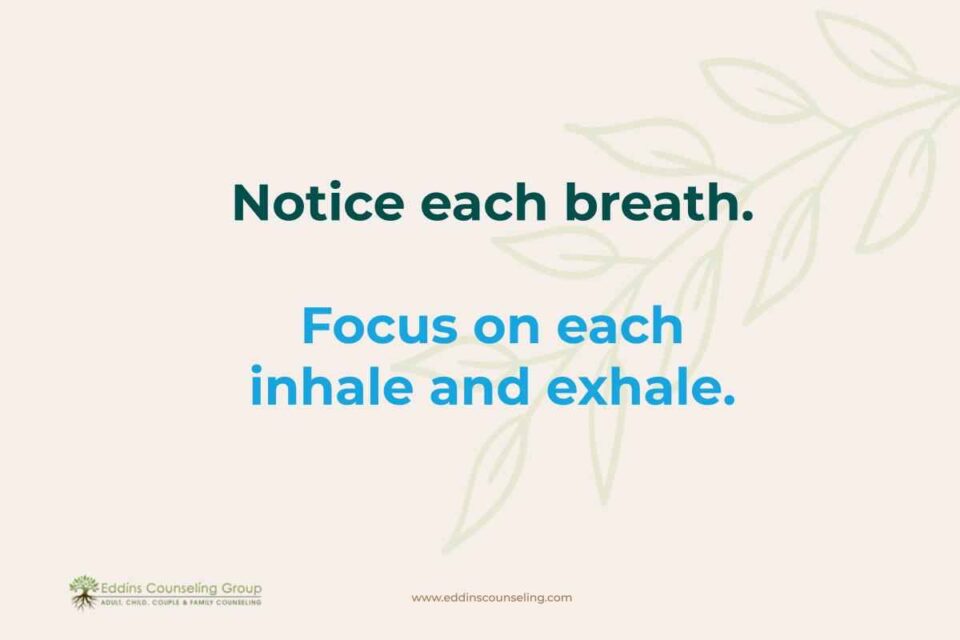
Do not try to hold on to them or make them go away.
See if you can open your heart and make some room for the discomfort, for the tension, for the anxiety, just allowing them to be there. Is there enough space in you to welcome all of your experiences?
Watch the sensations change from moment to moment. Sometimes they grow stronger. Sometimes they stay the same, and sometimes they grow weaker. It does not matter.
We’re going to come only into and out from the sensations of discomfort, imagining the breath moving into and out from that region of the body. Remember, your intention is not to make you feel better, but to get better at feeling.
If you ever notice that you are unable to focus on your breathing because of intense physical sensations of discomfort in your body, let go of your focus on your breath and shift your focus to the place of discomfort.
Gently direct your attention on and into the discomfort and stay with it, no matter how bad it seems.
Take a look at it. What does it really feel like?
Again, see if you can make room for the discomfort and allow it to be there. Are you willing to be with whatever you have?
Along with physical sensations in your body, you may also notice thoughts about the sensations and thoughts about the thoughts.
You may notice your mind coming up with evaluative labels such as dangerous or getting worse. If that happens, you can thank your mind for the label and return to the present experience as it is, not as your mind says it is.
Noticing thoughts as thoughts, physical sensations as physical sensations, feelings as feelings, nothing more and nothing less.
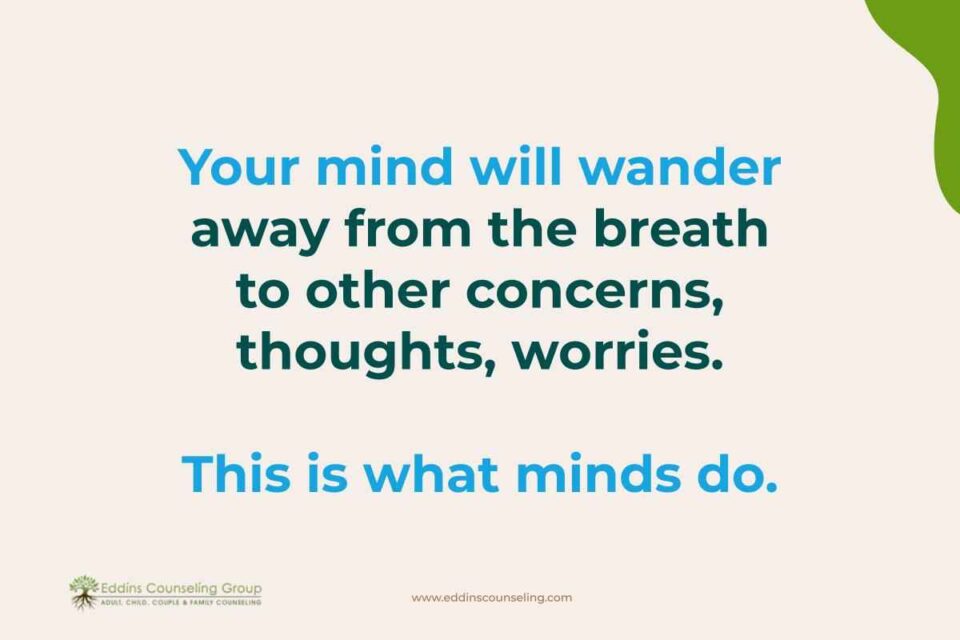
To help you experience the difference between yourself and your thoughts and feelings, you can name thoughts and feelings as you notice them. For instance, if you notice you are worrying, quietly say to yourself: “Worry, there’s worry”.
Just observing worry and not judging yourself for having these thoughts and feelings. If you find yourself judging, just notice that and call it” “Judging. There is judging”. And observe that with a quality of kindness and compassion.
You can do the same with other thoughts and feelings and just name them as planning, reminiscing, longing, or whatever you experience. Label the thought or emotion and move on.
Thoughts and feelings come and go in your mind and body. You are not what those thoughts and feelings say, no matter how persistent or intense they may be.
Gradually widen your attention to take in the sounds around you. Notice your surroundings and slowly open your eyes with the intention to bring this awareness to the present moment and into the upcoming moments of the day.
The reason I really enjoy this exercise is it encourages you to bring compassion and kindness to how you’re feeling and to also notice any thoughts and images, and your emotional response to any of those thoughts and images.
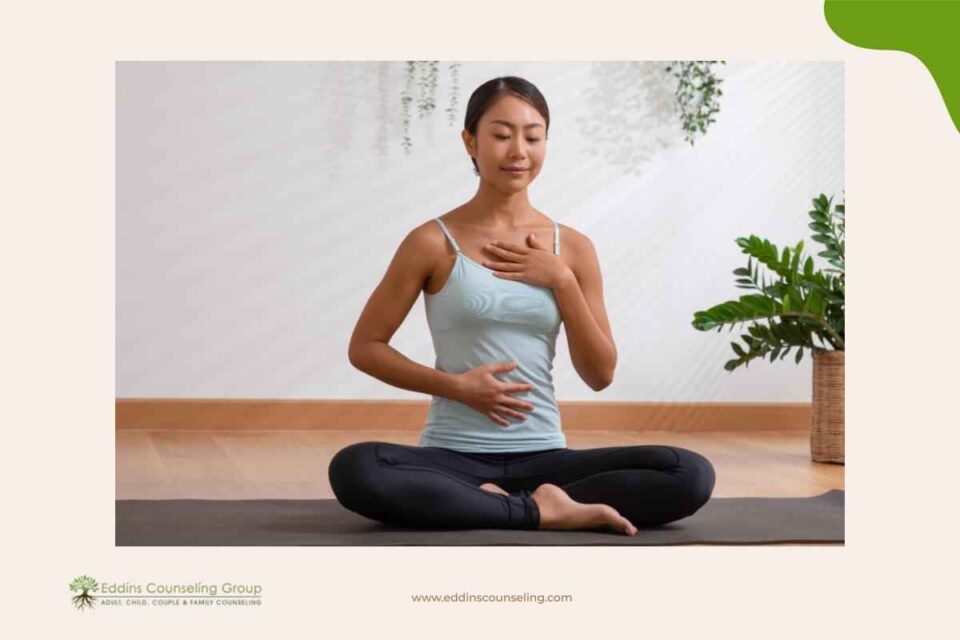
I think it’s really important to focus on what feelings are you having.
Are you thinking:
- “I can’t believe I’m feeling anxious again.
- I’m feeling this pain in my stomach.
- Why does this keep happening to me?”
I think that’s an easy place to go.
I think we’re often harder on ourselves than maybe anybody else would be.
So having that compassion and kindness for yourself and really noticing what your experience is without trying to manage it. This is definitely difficult and does take practice.
You might have to do this exercise multiple times before you can really shift into a moment when you are feeling anxious and can notice the feelings that you’re having, the thoughts, maybe the physical symptoms that you’re having, and really look at yourself with compassion and kindness.
I think that one of the most important things, when you do have anxiety, is to be kind to yourself.
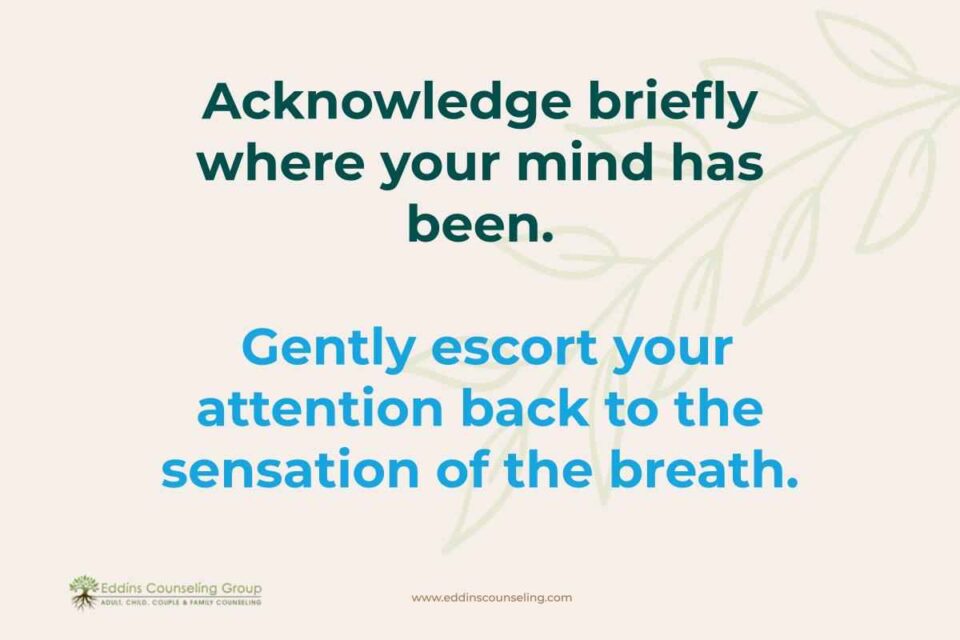
Expressive Arts Creativity
The next activity is an expressive arts activity. So you can use a pen, pencil, markers, paint, any paper, notebook paper, printer paper, and mixed media. I like to use the mixed media notebook for my art journaling.
This exercise is from Brené Brown. I definitely recommend her work. I did the Oprah Life class with her, and this activity really resonated with me, and I felt would also resonate with you.
When you’re anxious, you have a lot of “shoulds: I should be a certain way”, and you need to give yourself permission to not have to do all of those “shoulds”.
So for instance, I give myself permission to make mistakes. As I said, people with anxiety tend to be much harder on themselves than anybody else can, and I am not immune to that.
I definitely struggle with moments of perfectionism, so I do give myself permission to make mistakes and not always be on top of things.
Sometimes I’ve had a bad day or it’s been a long week and I’m tired and I just don’t feel like doing the dishes. I give myself permission to go ahead and relax rather than do the dishes.
I also give myself permission to be anxious. That’s really important because so often we’re trying to not feel it and we get caught up in the not feeling that we end up shutting down in other areas of our lives.
We might shut our emotions down completely so that we don’t feel any anxiety at all.
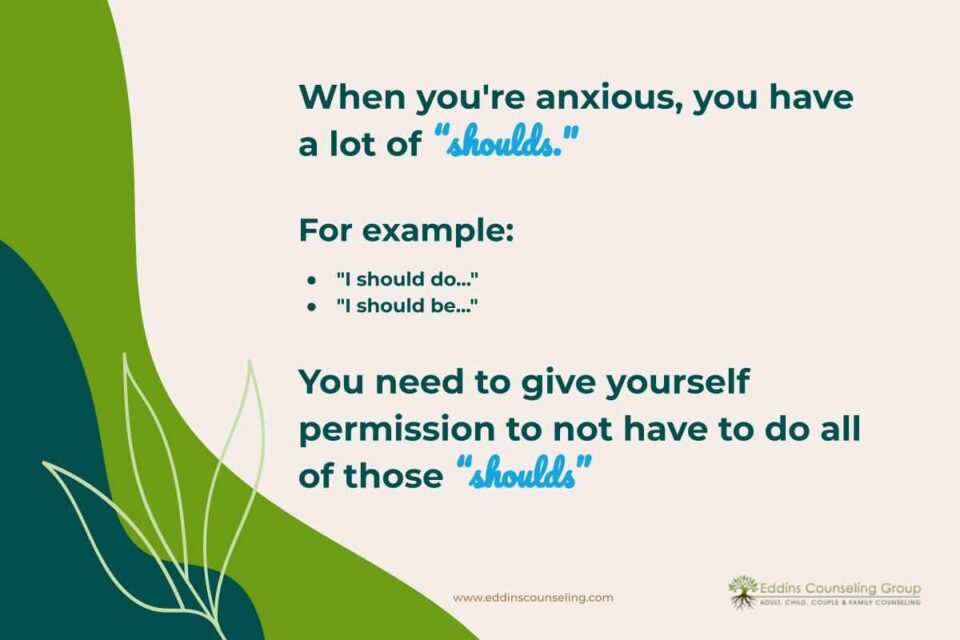
I personally would rather feel some anxiety so that I can feel all of my other emotions.
I try not to beat myself up when I am feeling anxious, which is why I gave my permission to feel that way.
Also, I also give myself permission to feel selfish sometimes. In retrospect, I wouldn’t necessarily say it’s being selfish. I would call it self-care.
If there are times when maybe I don’t feel like doing anything one night and I want to stay home and watch a marathon, I give myself permission to do that because that is self-care for me, I need to relax.
I also give myself permission to be messy and not have a perfectly clean house, as I mentioned. Not always on top of those dishes or cleaning up the kitchen, especially after I put in all the effort to cook something. So I might give myself permission to do it later.
Also, I give myself permission to be quiet if I need to. I am an extrovert, so I do get energy from other people, but there are times when I’ve been with people all day and I just want to be quiet and not talk to anyone on the phone, not text anyone, not have a conversation, just be with myself for a short time.
Also to be tired. If I’ve had a long week and I just want to take a nap, I give myself permission to be tired and to take a nap. I also give myself permission to be happy as I am.
We get hit by society with so many different messages about how we should be, how we should look, and how we should act. It can definitely be exhausting.
I give myself permission to be happy just as I am.
So these are just a few of the things I give myself permission to do and to be. I strongly recommend it, even if it’s on a piece of paper right in front of you, or it’s a Post-it note.
You want to write down things that you can give yourself permission for.
I think this is an excellent activity to help us be with ourselves and our anxiety and to continue to feel kind and compassionate toward ourselves.
I have this on my refrigerator so I can remind myself every day that I have this permission to be kind and compassionate and not always be on top of things and to make mistakes and not always have a perfectly clean house.
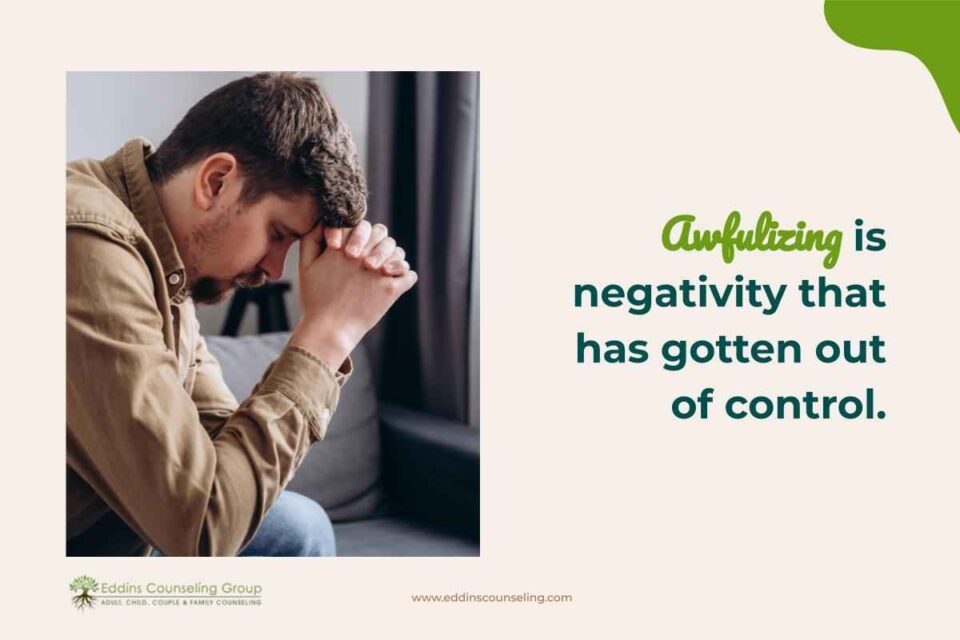
Awfulizing and Positivity
- What is “awfulizing”?
- What is the worst that could happen?
- Will it matter 5 years from now?
- What is positive about this situation?
- Acceptance
Next, I want to talk about what is awfulizing. Awfulizing is negativity that has gotten out of control. And everything is awful and horrible, and it couldn’t be much worse. You can’t think about anything positive. But notice I have awfulizing and positivity.
Turning towards the positive can definitely be a challenge when you are used to feeling negative and you are used to awfulizing things.
That’s a huge challenge for a lot of my clients, to go from negativity to positivity.
I feel oftentimes like I’m this little cheerleader and one day they’re just going to be like: “Shut up! I’m tired of hearing all the positives”. But it’s amazing how they eventually shift to becoming more positive themselves.
Some things I like to think about when I do start “awfulizing” how I can shift myself through the positivity is: what is the worst thing that could happen?
I tell a lot of my clients that I do career counseling with when I recommend they speak to someone for an informational interview to find out what their career is, and what it is they do all day.
I always say: “What’s the worst thing they can say to you? No?”
Okay, not so bad. Move on to the next.
Also, will it matter five years from now? If the thing that I’m worrying about and stressing myself out about, will I even remember that it was something I was upset about or worried about five years from now?
And then if I’m actively trying to shift into the positive, I think about what’s the positive in this situation.
For instance, a speeding ticket. Now, it’s easy to go into the negative and think: “I got this speeding ticket. My insurance is going to go up. I’m going to have to pay for the court. I might have to pay for defensive driving. Oh, my gosh, this is just one more thing I don’t need.”
Well, the positive of that is mindfulness.
I hope that a speeding ticket makes someone mindful of their speed so they can think about:
“Maybe I need to really focus on not driving 85 and stay at 65 at the speed limit, or maybe I’m going to go 5 miles over at 70 because going 85 can be very, very dangerous. It endangers you, and other people around you.”
You really have to think about it: I got this ticket. What’s positive about it?
Maybe you’ll be safer with yourself and around others and not speed as much. I think that’s definitely positive about a speeding ticket and I can credit my mother for this, actually.
I got my very first speeding ticket when I was 19 years old. And my father told me not to get a speeding ticket. I went home and I was crying to my mother and being the typical loving mother that she is, told me it was okay, and then shifted me into the positive of:
“Your dad might be a little upset. It’s going to cost you some money, but maybe this is something you needed to do to slow down your driving, slow down in life and really be mindful of your situation”.
What happens with positivity is you slide into acceptance, which may sound odd. I remember 10 years ago when I first started struggling with anxiety again, I looked for any self-help book that was out there that had to do with anxiety and I remember one of them mentioning acceptance and I thought:
I’m not going to accept this, I’m not okay with this. I don’t want to be anxious, I don’t want it to be impacting my life.
Well, you learn a lot of things when you’re becoming a counselor and when you are a counselor.
I learned to accept my anxiety because fighting it wasn’t helping me.
Acceptance is yet another way to be compassionate and kind to yourself.
To accept that this is a part of you that you just need to learn how to cope with better and find new strategies.
I can’t necessarily say that my own anxiety is completely disappeared, but it has definitely improved once I really accepted that.
This is a part of me that I cannot get rid of. So I’m going to accept it, realize it’s part of me, and then how can I be more positive about my situation and learn more about it to move forward in my life?
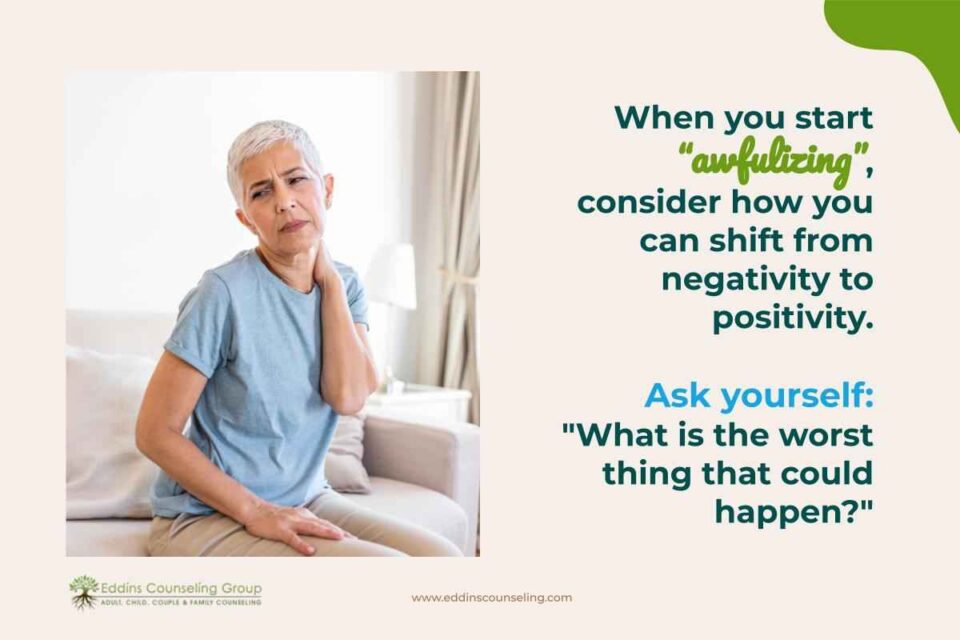
Healthy Boundaries
- Physical and emotional
- Tell others how you feel
- Empathize
- Ask for what you need
- Model the behavior that you desire
Boundaries are physical and emotional. Physical includes personal space. So having that personal space and letting someone know: “Hey, I don’t really like you touching me or being that close to me”.
And then emotional boundaries of maybe you don’t want your anxiety to be something you always talk about with friends and family members.
You could ask them to: “When we meet up, I don’t really want to talk about my anxiety. I want to know what’s going on with you, tell you other things that are going on with me”, and really have a moment to connect, which leads to telling other how you feel.
So if you feel like you’re already focusing on your anxiety too much in your life and then having other people ask about it (while they do care about you), you might just not want to talk about it since it’s such a pervasive part of your life at that moment.
Make sure to empathize with your loved ones because they don’t like to see you hurting.
They want to know how they can help. And that might be why they are talking about it because you haven’t told them what’s next, what you need. So make sure you ask for what you need.
As I mentioned, if you don’t want to talk about it at family functions, you make that boundary known to your loved ones and stick to it. If they start talking about: “How’s your anxiety? Why are you feeling anxious? Why can’t you just turn it off?” As if it was that easy.
Enforce that boundary. Let them know: “Hey, I don’t really want to talk about this right now. I appreciate you asking me about it and wanting to know how you can help, but I would rather not talk about it right now at this family function. Maybe we can connect later and talk a little bit more about it.”
Modeling the behavior that you desire is really important.
So they have their own boundaries that they have set up, not discussing maybe what they don’t want to discuss or maybe only talking about it in private rather than in a group.
So then they can turn around and go: “Okay, they did this for me, so I’m going to do the same thing for them when we’re in a similar situation”.
It’s also important to consistently enforce those boundaries.
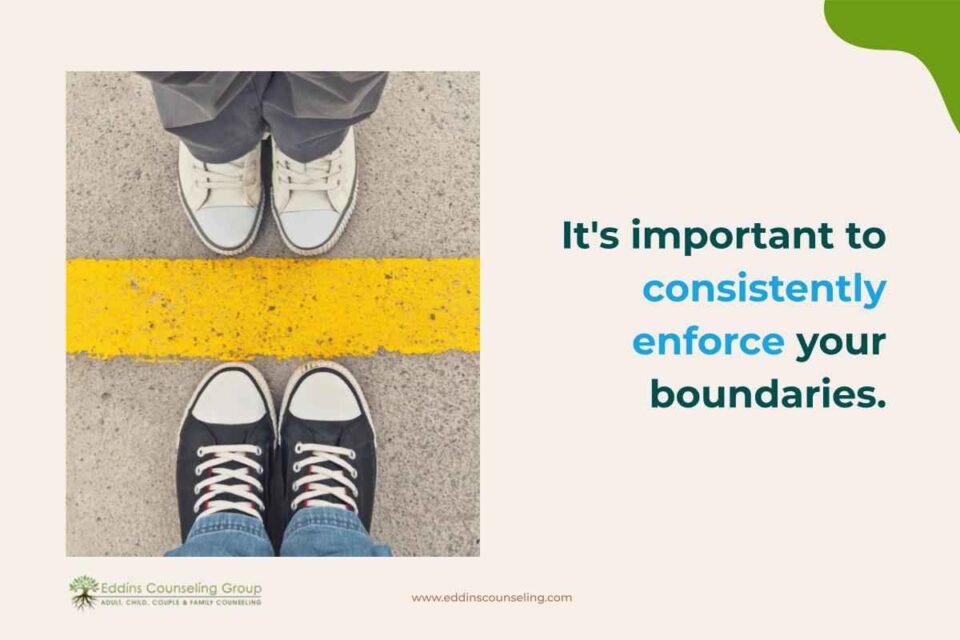
Now, I will say boundaries can be a little bit anxiety provoking because most people think: “What do I do if they don’t follow my boundaries?”
Well, then that’s a conversation you need to have with that individual. It’s definitely important to be open with them and have a discussion.
If they’re absolutely disrespectful, then maybe you don’t need that person in your life for this amount of time while you’re dealing with what you’re dealing with, be it anxiety or chronic illness or a newly diagnosed illness or your marriage or your divorce.
This can go for anything. It doesn’t necessarily need to go just for boundaries.
I am going to do a webinar that’s more in-depth about setting healthy boundaries and what they are and have different scripts of what it looks like and how to speak to people.
As I said, discussing your boundaries with someone can be very challenging and scary because what if they don’t like what your boundaries are?
Well, then you have to really think about, how important are these boundaries to me. Probably very important. I think really thinking about them and maybe discussing them in depth is definitely important.
How Counseling Can Help
- Client and counselor fit is key
- New perspectives and new ideas
- No opinions or advice-giving
- “Judgement-free Zone”
- Collaboration is essential
I like to mention how counseling can help. As I mentioned, I sought counseling myself, which I found incredibly helpful. For those that may have never been to see a counselor before, I like to point out some things that I feel are incredibly important in the counseling process.
Client and counselor fit is key. As counselors, we learn how important fit is in that, not every personality meshes.
So if, for instance, you go to your first counselor, you don’t necessarily feel that you’re a good fit or that they really understand what you’re talking about. Discuss that with them.
They might recommend someone that they feel might be a better fit for you.
You shouldn’t stop seeking counseling just because your very first counselor is not a good fit.
As I mentioned, personalities can be very different. So it’s important to find someone that you really feel understands you and that you can connect with.
Counseling and talking to a counselor can give you new perspectives and new ideas.
There are a lot of times that I’m not part of the situation that my client is talking about, so I can give them a different perspective than maybe someone who is connected to them, who loves them, or who is a loved one.
So giving those new perspectives and new ideas can be really essential.
As well as no opinions or advice giving. It’s very rare that a counselor will ever give their opinion or their advice.
The counseling process is for the client to figure out what’s going on themselves without having someone give them an opinion. Your family usually has enough opinions for you.
So you come to a counselor so that you have a judgment-free zone. I know I tell all of my clients that they can tell me whatever they need (depending on some legal concerns).
But it is a judgment-free zone and I’m never going to judge my client or laugh at them for what they feel about or what they’re anxious about.
Some people come in and say: “Oh, God, gosh, this is so silly. I shouldn’t feel anxious about this”.
Well, you feel what you feel and that’s what’s important. I also think collaboration is essential. It’s not a one-sided relationship where the counselor does all the work or makes all the recommendations.
Collaboration is really important for the counseling process to be successful. Always collaborate with your counselor to be successful and to move through that anxiety.
How I Can Help
I’ll never ask you to do anything I wouldn’t personally do. I think that’s part of the collaboration piece and the fit piece of counseling. I would personally do whatever I asked or any techniques that I mentioned.
Also, I never require my clients to do what I suggest. It’s simply a suggestion. And while I’d prefer, they would ask me: “Hey, I don’t really feel comfortable with that”.
I think having that dialog is really important for collaboration. So then you might brainstorm together of some ways that they would feel comfortable and what maybe strategy I recommended and how we could adjust it for their comfort level.
Something that’s different about me is that I am very open about having anxiety and knowing what it feels like and how hard it is. It’s really hard when someone hasn’t been there.
I think that’s why we often feel like some of our family members or our friends or our colleagues can be insensitive because they don’t know what we’re going through.
They will ask things like: “Well, why can’t you just stop worrying about it?” Trust me, if it was that easy, I would do it.
I do like to use some of the expressive arts in my therapy, but you don’t have to be an artist or even creative or any good at art.
I think that’s something I hear a lot from my clients when I mention anything creative. There is a lot of hesitation: “I’m not really an artist”. You don’t have to be.
I like expressive arts because it touches a different part of the brain, I feel. A lot of my clients open up more than they ever have in a lot of art sessions where it was purely talking.
So sometimes if I feel like we might not be moving forward or my client needs something different, we’ll try some different art activities. There are a lot of different kinds of expressive arts, art-based music, and dance.
I personally only prefer art-based just because there’s a lot you can do with it. You can use any supplies. You don’t even have to have anything special. That’s why I really enjoy using the expressive arts in conjunction with talk therapy.
Still Struggling?
- “Get Out of Your Mind and into Your Life” by Steven Hayes
- “Anxiety and Phobia Workbook” by Edmund Bourne
- “The Relaxation and Stress Reduction Workbook” by Matthew McKay and Martha Davis
- “The Happiness Trap”, “The Reality Trap”, and “The Confidence Gap” by Russ Harris
If you’re still struggling, these are some resources that I strongly recommend.
“Get Out of Your Mind and Into Your Life” by Steven Hayes is a great workbook. Most of these are going to be workbooks in a way that I have used with clients, things that have different strategies. You can work through different activities that they recommend. So “The Anxiety and Phobia Workbook” by Edmund Born.
“The Relaxation and Stress Reduction Workbook”. I really like this one, even though it doesn’t specifically say anxiety, more so stress reduction and relaxation because sometimes relaxation, I feel, can really impact some of your anxiety symptoms.
So the relaxation we did earlier is something that’s good before you go to bed at night to help you relax and stop the anxious cycle of keeping you up at night or waking you up in the middle of the night so you can’t fall back asleep.
It gets you into that relaxed state so that you can sleep longer and deeper. That’s why I like “The Relaxation and Stress Reduction Workbook”.
They also have some progressive muscle relaxation exercises, which I also really like for sleep because it relaxes the body as well as the mind.
You can find some YouTube videos where people are leading you through a relaxation that’s similar to what I did, but they tell you to relax each muscle group individually.
So relax your feet, relax your calves, relax your knees, your thighs. That’s also a different relaxation that’s really helpful. Maybe the relaxation we did was not as helpful for you.
I also like pretty much anything by Russ Harris. “The Happiness Trap”, “The Reality Slap”, and “The Confidence Gap”. They’re very different and do different areas, but they’re all filled with some really great exercises that you can carry over into your everyday life.
So I definitely recommend anything by Russ Harris. He is an excellent clinician and an excellent author.
Questions
How do you take time for yourself without your family feeling neglected and without feeling guilty?
Well, first of all, if you’re struggling to take time for yourself, I definitely recommend you have a conversation with your family about your feelings because sometimes resentment can build up and people don’t know what you’re feeling unless you tell them.
Self-care is really important, especially if you’re a mother or a wife, husband, dad, sister, brother, or anyone in any caring function.
It can be a lot of work.
Taking time out for yourself can definitely make you feel guilty.
But think about being on an airplane. Anytime you fly, they tell you:
“If the air mask comes down, make sure you put your mask on before or you help the person next to you or the child next to you”.
You have to remember that unless you’re taking care of yourself, you can’t really take care of anyone else to the best of your abilities.
So I think your family will find that you’re a lot happier and they’re a lot happier if you take out time for yourself for self-care.
Even if that’s taking a hot bubble bath while reading a book, maybe going and getting a massage once a month, or going to dinner with a friend that you haven’t seen in a long time. If you prefer, try outdoor yoga or going to an art studio.
I think those are all great examples of self-care where you just take a little bit of time out for yourself to take care of your needs.
How would you suggest addressing anxiety as someone who has witnessed domestic violence?
Domestic violence is a very different kind of anxiety as I mentioned before with Post Traumatic Stress Disorder (PTSD). It’s more of a trauma than typical anxiety.
A technique that I like is called Eye Movement Desensitization and Reprocessing. It allows the client to build a unique set of tools in an EMDR session, as well as it uses bilateral stimulation.
So maybe the clinician moves their hand and the client has to watch their hand with their eyes for a certain amount of time. Or they have these electronic tappers that buzz in your hands.
For trauma clients, EMDR can be really helpful because it accesses a different part of the brain so that they can discuss this traumatic experience in a safer way so that they can get through the experience without having to relive the trauma.
I strongly recommend this. This is also a technique that I use and it’s great for any trauma, domestic violence, child sexual abuse, sexual assault, or anyone from the military.
I definitely recommend this for someone that is maybe feeling anxiety after witnessing domestic violence.
What if what you’re worrying about is a real threat to someone you love? I know it’s natural to worry about family when things are bad, but mine gets me to the point that I can’t function.
I feel this question also goes back to self-care.
Unfortunately, when someone you love is making bad choices, you can’t control the choices that they choose to make.
Or if, for instance, they have an addiction like drugs or alcohol, they have to want to get help and be at a point where they can want to get help.
Addictions can be very strong. So part of that self-care, I recommend getting support, whether it’s a group in person like Al-Anon Family Groups or a Facebook group.
Personally, I have a chronic illness and I have found huge support from a few different groups on Facebook. I even have a Houston group and we have day-long conferences, we have dinner meetings, we go to events together.
Having people who have been through the same experience and know what you are feeling is really important.
If you can’t attend a support group in person, I would reach out maybe to different forums or to Facebook for some of those groups. You can’t help this person if you’re not taking care of yourself.
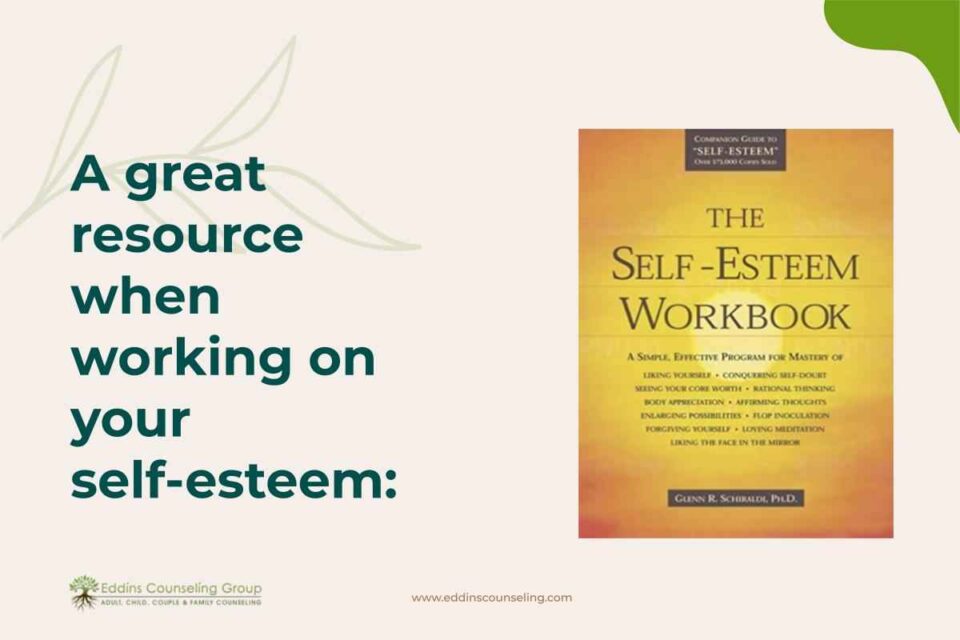
What about anxiety and always needing approval from others?
For that anxiety, I feel that you would want to work on your self-esteem and self-worth because you’re looking outside of yourself for that confirmation of “I am doing good things. I am a good person”, rather than finding that confirmation within.
So I think definitely work on your self-worth and realize that you do make good decisions.
You are a good person and knowing that from within yourself is really important to work on.
There’s a really good workbook that I like called “The Self-esteem Workbook” by Matthew McKay.
I think that would be a great place to start if you’re not already seeing a counselor and working with someone because that area can definitely be challenging because you also have anxiety and you’re also dealing with self-esteem, and self-worth issues.
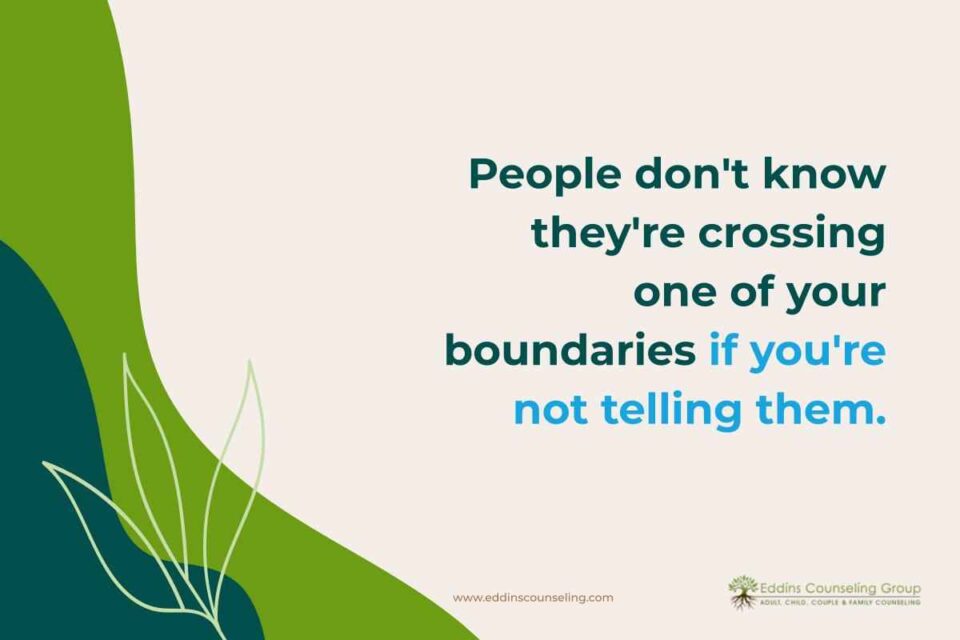
How to set healthy boundaries?
I discussed a little bit of setting healthy boundaries previously, but again, I want to reiterate that it’s really important to tell people how you’re feeling.
People don’t know they’re going over one of your boundaries if you’re not telling them how you’re feeling.
And again, I think it’s really important to empathize because they love you.
They don’t want to see you in pain.
They don’t want to see you upset.
All they just want is to help, but they might not be going the best way about it.
It’s also important to just really be honest about your boundaries and why you have them and enforce them.
Be strong about standing by your boundaries, even if it is really scary and you’re thinking:
“What if I put up this boundary and they never talk to me again?”
Well, if that boundary is really important to you, you might not want to talk to that person if they refuse to respect your boundaries. It’s part of respecting you as an individual by respecting your boundaries.
So I think that’s really important to think about:
- What are your boundaries?
- How important is each boundary?
- What are you willing to accept and what are you not willing to accept?
- How important is standing by those boundaries to you?
As I said, I will be having a webinar that goes a lot more in-depth into healthy boundaries. So please check out our website for when that is going to be and for future updates.
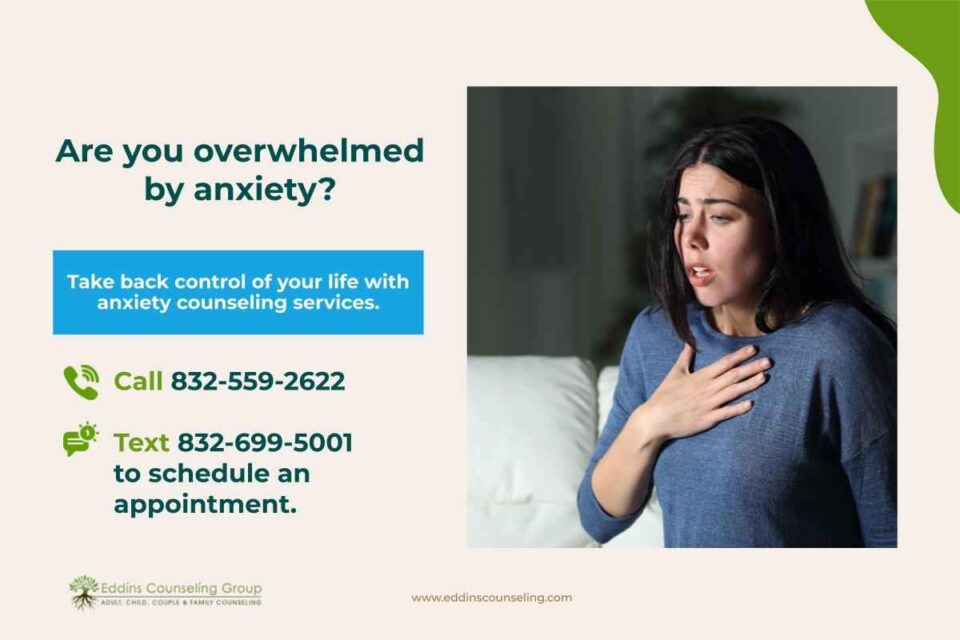
You can also subscribe to our newsletter to find out when other groups are going on and when we might have more webinars, and to learn more about each counselor and what each of us do, and what we specialize in.
If you are ready to get started with one of our anxiety therapists, call us (832) 559-2622 or text us (832) 699-5001 to schedule an appointment or to find out more about anxiety treatment.
So thank you so much for attending this webinar today. I appreciate your participation and your great questions. I look forward to seeing you at my next webinar. Have a great day.
5 Ways to Reduce Anxiety
Get instant access to your free ebook.
Grounding & Self Soothing
Get instant access to your free ebook.
Create Healthier Thoughts & Feelings
Get instant access to your free ebook.
Why You Feel This Way
Get instant access to your free ebook.

